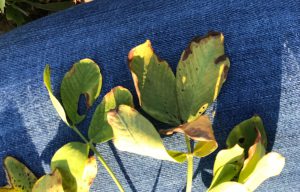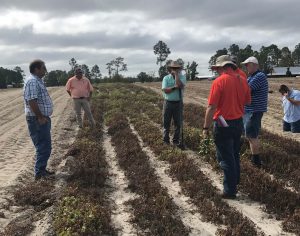Peanuts – An Environmentally Friendly Crop
Sustainable farming includes operating in an economically feasible way, while maintaining the health of the land and surrounding environment at the same time. Peanuts are a popular option because most producers use minimal inputs on the crop thereby decreasing environmental impact. Peanuts are a crop that fits very well into an agricultural rotation in the sandy soils of North Florida. The peanut is very resilient in our unpredictable climate but does not respond well to excessive soil moisture and saturation for prolonged periods of time. Furthermore, the peanut plant is much less “water hungry” than other crops and many growers without the option to irrigate can plant dry-land acres and still maintain a profit. Additionally, the peanut is classified as a legume which adds nutrients back to the soil. Overall, peanuts require less fertilizer applications and other costly inputs compared to other traditional field crops.
In Florida, there is an annual production value of roughly $145 million attributed to peanut farms. The bulk of this production comes from the Suwannee Valley and the Panhandle totaling over 670 million pounds of peanuts annually. In 2017, there were over 81,000 planted acres of peanuts in the Suwannee Valley alone.
Peanut Producer Update
During the 2017 growing season, peanut producers in North-Central Florida experienced a massive dive in yield production. Yields were reduced by about 1,000 pounds plus per acre on average in the affected area. Those affected most by this “peanut collapse” (of unknown cause) were located in the Suwannee River Basin region of the state. According to Levy County Extension Agent, Anthony Drew, the amount of peanuts impacted by this widespread decline has been estimated at roughly 25,000 acres in this part of the state. An additional caveat to this anomaly was that although yields were drastically reduced last year, peanut quality and grade were maintained – for the most part.
A few of the abnormal challenges faced by growers last year included:
- Poor plant stands and low seed vigor.
- A higher than usual occurrence of disease, insect pests, and nematodes.
- Consistent high levels of moisture and rainfall.
- Low amounts of sunlight during June through August during critical times of peanut plant development and bloom set.
- Lower than average nighttime ambient air temperatures throughout the growing season.
- Hurricane Irma – which potentially exacerbated the issue by bringing in more moisture and caused physical damage to the vines due to high winds.
Halfway through the growing season, late planted peanuts exhibited symptoms of yellowing of leaf margins followed by premature browning and defoliation. During this time, multiple diseases and disorders were showing up all at once (in some cases), further weakening the already frail plants. At harvest, peg strength was subpar, and peanuts pulled off the weak vines easily during digging and harvest, leaving the pods behind in the ground.
Moving into this growing season, avoid planting peanuts in the same location peanuts were planted last year. If you were able to plant early, that is a plus as the earlier planted peanuts were not generally affected by last year’s decline issue. Use soil moisture sensors to monitor soil water, and only irrigate when the crop calls for an irrigation treatment based on the sensor data. Lastly, it is very important to start out with a strong fungicide program to treat emerging disease, as we have already begun the season with heavy moisture. Contact the UF/IFAS Suwannee County Extension office for resources to help with a plan for your spray program or information on managing soil moisture technology.


UF/IFAS Extension is an Equal Opportunity Institution.
 0
0
